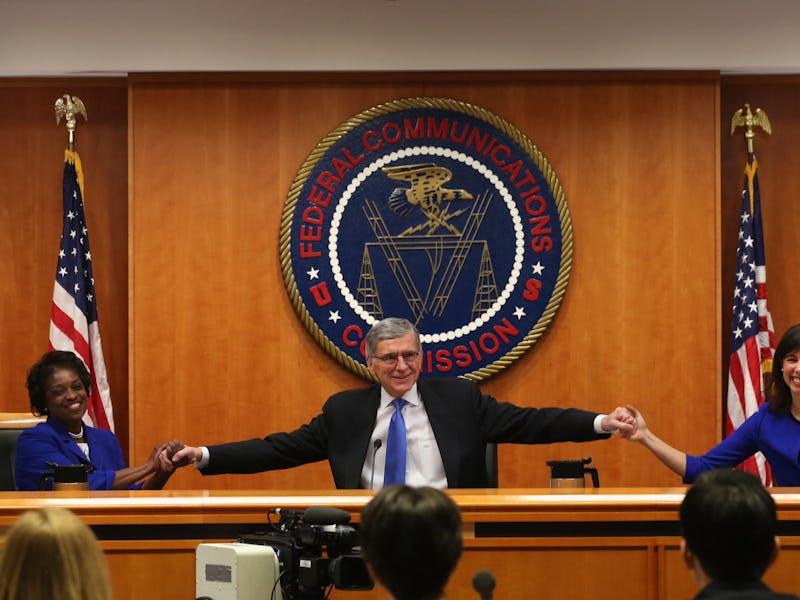Net Neutrality Activists Celebrate Ruling: "Go Team Internet!"
The geekiest policy in D.C. is now the law.

After a Federal Appeals Court upheld the Federal Communication Commission’s plan to regulate the internet as a utility and effectively guarantee net neutrality, activists are enjoying the rare celebratory moment before returning to their posts for the inevitable Supreme Court challenge.
The Electronic Frontier Foundation, in a blog post titled “Go Team Internet!” cheers the Tuesday verdict, an endearing if somewhat geeky display of excitement.
The post explains the main advantages of the ruling:
In a crucial win for Internet users … a federal appeals court upheld clear net neutrality rules that will let us all use and enjoy the Internet without unfair interference from Internet service providers. The rules will keep providers from blocking or slowing traffic, or speeding up traffic for those who pay.
But even in this moment of good feeling, the EFF felt it was necessary to warn its followers that the fight to secure net neutrality is far from over.
“And we will doubtless need to defend the gains we have made — the telecoms will doubtless seek to challenge the ruling in Congress and the Supreme Court,” the post concludes. (AT&T has already promised an appeal.)
At FCC headquarters, Chairman Tom Wheeler and his team seemed equally excited about the Appeals court ruling. A picture posted to the FCC’s Instragram page shows the leadership gathering around a copy of the ruling looking mighty pleased with themselves.
Wheeler, of course, has not always seemed such a close friend to net neutrality activists, and shortly after taking office, it seemed he planned to introduce rules that would have scrapped the idea altogether. But after internal deliberations, and, some argue, undue influence from the White House, which endorsed net neutrality in November 2014, the FCC introduced the current pro-neutrality regulations in early 2015.
The victory was also a particularly full-throated one for the FCC. Not only did the judges rule that the FCC could regulate the internet as a utility, but it also granted two procedural hurdles that would have delayed a ruling on the major question. Since this question has never come before the Supreme Court, it is impossible to know how the judges will rule when they do finally hear it. But the common wisdom seems to indicate that sooner is better, because now if the Court splits its vote 4-4, the Appeals Court pro-neutrality ruling becomes the law of the land.
As to what happens if the case drags into the next administration, the next president of the United States will likely determine, perhaps inadvertently, the policy by filling the open seat on the Supreme Court, left vacant by Antonin Scalia upon his death earlier this year. Of course, net neutrality hardly compares with abortion, campaign finance, or gun control as judicial priorities for most administrations, but the tendency for presidents to appoint justices with similar views on a range of issues cannot be ignored.
Donald Trump has expressed skepticism about net neutrality, particularly about the so-called Fairness Doctrine which can be used to target conservative media, but overall he has avoided taking a clear stand on either the FCC rulings or the recent Appeals Court case. Hillary Clinton, on the other hand, has taken a strong supportive stance of the new rules and even added her own appreciation to the recent ruling.
Most people are just a little perplexed about what net neutrality really means and how it affects their lives, and even those of us who know it’s vitally important to the future of a democratic society still kind of agree with this sentiment, too.